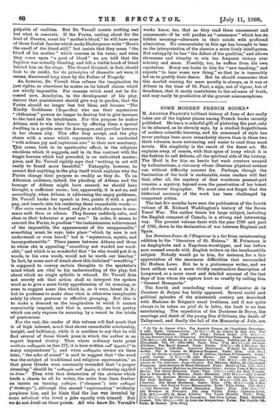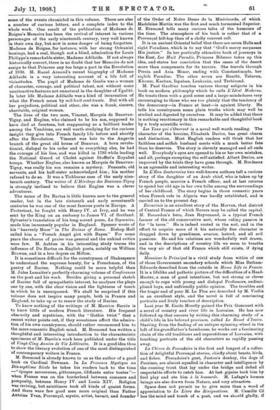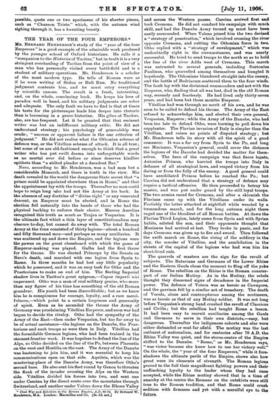SOME MODERN FRENCH BOOKS.*
M. ANATOLE FRANCE'S brilliant history of Joan of Arc easily takes one of the highest places among French books recently published. He has a w,Inderful gift of picturing the past, only to be attained, as he cleverly says, by a studied forgetfulness of modern scientific learning, and his command of style has never perhaps been more remarkably shown than in these two thick volumes, more entrancing and easier to read than most novels. His simplicity is the result of the finest art. He explains away, of course, with that spice of irony which it is the fashion to call delicate, all the spiritual side of the history. The Maid is for him an heroic but weak creature swayed by hallucinations, a visionary whose illusions physical science can without difficulty account for. Perhaps, though the fascination of the book is undeniable, some readers will feel that, after all, the mystery of that wondrous peasant-girl remains a mystery, beyond even the penetration of her latest and cleverest biographer. We must also not forget that the historical accuracy of the work has been challenged by competent critics.
The last few months have seen the publication of the fourth volume of M. Richard Waddington's history of the Seven Years' War. The author treats his large subject, including the English conquest of Canada, in a strong and interesting way. The present volume deals with the year 1760 and part. of 1761, down to the declaration of war between England and. Spain.
Les Derniers Tours de l'Empereur is a far from uninteresting addition to the "literature of St. Helena." M. Fremeaux in an Anglophobe and a Napoleon-worshipper, and has before now crossed swords with English writers on the inexhaustible subject. Nobody would go to him, for instance, for a fair appreciation of the enormous difficulties that surrounded Sir Hudson Lowe. But he is a picturesque writer, and we have seldom read a more vividly unattractive description of Longwood, or a more exact and detailed account of the last days of him whom his captors hurt so cruelly by calling him. "General Bonaparte."
The fourth and concluding volume of .111-4moires de la Comtesse de Boigne has lately appeared. Several social and. political episodes of the nineteenth century are described with Madame de Boigne's usual liveliness, and if not quite- always to be taken au pied de la lettre, the book is no less entertaining. The expedition of the Duchesse de Berry, the. marriage and death of the young Duc d'Orleaus, the death or Talleyrand, and finally the fall of the Monarchy of July, are * (1) Vie de Jeanne d'Arc. Par Anatole France, de l'Acadetnie Francaise.
2 vols. Paris : Calmann-Lery. [15 fr.]—(2) La Guerre de Sept Ans. Par • Richard Waddington. Tome IV. Paris : Firmin Didot. fr. 50 cri— • (3) Les Dentiers Jours de l'Empereur. Par Paul Fremeanx. Paris : Flammarion. [3 fr. 50 c..)—(4) /Unwires de la Comtesse de Boigne. Publies par H. Coaries Nicoulland. Vol. IV. (1831-1866). Paris: Plon. 17 Cr. 50 c.)—(5) AdiStaide • d'Or/Eans. Par Raoul Arnaud. Paris : Perrin. [5 fr.]—(6) L'Heritage des Beauvan-Tigny 1750,1S3G. Aventures Historiques. D'Aprhs les Documents . inedits. Par le Comte de Miramon-Fargues. Paris : Plon. [3 Cr. 50 c.] — (7) Du Bartels en Angleterre. Par II. Ashton, Docteur d'Universite. Paris s,mile Larose. [5 fr.]—(8) Jean Racine. Par Jules Lemaitre. de . l'Academie Francaise. Paris : Calmann-Levy. [3 Sr. 50 c.]—(9) Vinot-Cinq , Annies de Vie Litteraire Pages Choisies. Par Maurice Barth], de l'Academie . Francaise. Introduction de Henri Bremond. Paris : Blond et Cie. [3 Cr. 50 c.]
— (10) La Provence Mystique au Dix-septiente Antoine Yvan et Made:eine . Martin. Par Henri Bremond. Paris : Plon. [5 fr.] —(11) Les Huit Par la Princesse G. V. Bibesco. Paris : Hachette. [3 fr. 50 c.]—(12) L'ideal • Moderne: La Question Morale—La Question Sociale—La Question Reliqieuse. Par Paul Gaultier. Paris : Hachette. [3 Cr. 50 c.]—(13) Les Year gut, s'Ouvrent. Par Henri Bordeaux. Paris : Plon. [3 Sr. 50 c..]—(14) LEair _ Souterraine. Par Paul et Victor Margueritte. Paris : Felix Juven. [3 fr. 50 c..] —(15) Enracines. Par Alfred Barandon. Paris : Plon. [3 Cr. 53 (16) Monsieur if Principal. Par Jean Viollis. Paris : Calmnun-Levy. t3, fr. 50 e.]—(17) La Roue d'Ivoire. Par Emile Moselly. Paris 3 fr. 50 c.]—(18) La Chivre de Pescadoire. Par Lon Lafage. Paris : Bernard rasset. 13 Sr. 50 4:4]—(19) Le Livre des ResignatiOne: Poems. Par Camilla C6., Paris : E. Sansot. 13 fr. 50 al
some of the events chronicled in this volume. There are also a number of curious letters, and a complete index to the whole work. One result of the publication of Madame de Boigne's Memoirs has been the revival of interest in various personages of the early nineteenth century, very well known in their own day, but now in some danger of being forgotten.
Madame de Boigne, for instance, with her strong Orleanist leanings, had a real, though not a blind, admiration for Louis Philippe's remarkable sister, Madame Adelaide. If not always historically correct, there is no doubt that her Memoirs do not assign to that Princess any too large a part in the Revolution of 1830. M. Raoul Arnaud's recent biography of Madame Adelaide is a very interesting account of a life full of vicissitudes. The pupil of Madame de Genlis was a woman of character, courage, and political talent, not without some unattractive features not unnatural in the daughter of Egalite. In later life Madame Adelaide was a kind of incarnation of what the French mean by mil-huit-cent-irente. But with all her prejudices, political and other, she was a frank, sincere, charitable, original woman.
The lives of the two men, Vincent, Marquis de Beauvan- Tigny, and Eugene, who claimed to be his son, supposed to have died at fourteen, but reappearing as a brilliant leader among the Vendeens, are well worth studying for the curious insight they give into French family life before and shortly after the Revolution. Vincent was heir to the Angevin branch of the great old house of Beauvau. A born revolu- tionist, disloyal to his order and to everything else, he had the courage of his line, and was killed in 1793 while leading the National Guard of Cholet against Stoffiet's Royalist troops. Whether Eugene, also known as Marquis de Beauvau- Tigny, was really his son remains a mystery. Peasants, old servants, and his half-sister acknowledged him ; his mother refused to do so. It was a Tichborne case of the early nine- teenth century. The writer of L'Heritage des Beauvau-Tigny is strongly inclined to believe that Eugene was a clever adventurer.
The name of Du Bartas is little known now to the general reader, but in the late sixteenth and early seventeenth centuries be was one of the most famous poets in Europe. A Protestant, he fought with Henry IV. at Ivry, and be was sent by the King on an embassy to James VI. of Scotland. Sylvester's translation of his long sacred poem, La Sepmaine, made him immensely popular in England. Spenser wrote of his "heavenly Muse" in The Raines of Rome. Bishop Hall called him a "French Angel girt with Bayes." For some years the chorus of praise was general and the unkind critics were few. M. Ashton in his interesting study traces the influence of Du Bartas on English poets, notably on William Browne, and in a less degree on Milton.
It is sometimes difficult for the countrymen of Shakespeare to understand the supreme beauty, for a Frenchman, of the poetry of Racine. Nothing could be more helpful than M. Jules Leniaitre's perfectly charming volume of Conferences on the poet and his work. Besides giving a personal sketch of Racine full of sympathetic interest, he analyses the plays one by one, with the clear vision and the lightness of touch in which be is unsurpassed. We shall be surprised if this volume does not inspire many people, both in France and England, to take up or to renew the study of Racine.
To know nothing of the writings of M. Maurice Baines is to know little of modern French literature. His frequent obscurity and mysticism, with the "Gothic twist" that a recent writer points out, if they sometimes affect the admira- tion of his own countrymen, should rather recommend him to the more romantic English mind. M. Bremond has written a thoughtful and interesting introduction to the characteristic specimens of M. Barres's work here published under the title of Vingt-Cinq Anne'es de Vie Litteraire. It is a good idea thus to show the literary evolution of one of the most distinguished of contemporary writers in France.
M. Bremond is already known to us as the author of a good book on Cardinal Newman. In La Provence Mystique au Dtx-septieme Siècle he takes his readers back to the time epoque savoureuse, pittoresque, edifiante entre toutes "- when France was on the borderland between romance and pomposity, between Henry IV. and Louis XIV. Religion was reviving, but saintliness took all kinds of quaint forms. And there were few good men more original than Father Antoine Yvan, Provencal, mystic, artist, hermit, and founder of the Order of Notre Dame de Is Misericorde, of which Madeleine Martin was the first and much tormented Superior. M. Bremond tells many curious tales of the humours of the time. The atmosphere of his book is rather that of a Provencal hill-top than of a chilly convent cell.
It is an ancient Oriental belief that there are seven Hells and eight Paradises, which is to say that "God's mercy surpasses His justice." In her poetically attractive book of journeys in the East, Les Huit Paradis, Princess Bibesco takes up this idea, and states her conviction that the oases of the desert more than compensate for its terrors. She travels through Persia and Asia Minor, ending with Constantinople, her eighth Paradise. The other seven are Rescht, Teheran, Khoum, Kitchen, Ispahan, Lenkoran, and Trebizond.
At. Paul Gaultier touches various thorny subjects in his book on modern philosophy which he calls L'Idial Moderns.
He treats them with a good sense and a large-mindedness very encouraging to those who see too plainly that the tendency of the democracy—in France at least—is against liberty. He tells his countrymen some plain truths which may well be studied and digested by ourselves. It may be added that there is nothing reactionary in this remarkable and thoughtful book by a truly scientific writer.
Les Yeas qui s'Ouvrent is a novel well worth reading. The character of the heroine, Elisabeth Derize, has great charm and distinction. Most English readers will think that her faithless and selfish husband meets with a much better fate than he deserves. The story is cleverly managed and all ends well. Everybody's eyes are opened to his or her own mistakes, and all, perhaps excepting the self-satisfied Albert Derize, are improved by the trials they have gone through. M. Bordeaux is an agreeable and interesting writer.
In L'Eau Souterraine two well-known authors tell a curious story of the daughter of an Arab chief, who is taken up by French people, marries a French officer, and at last returns to spend her old age in her own tribe among the surroundings of her childhood. The story begins in those romantic years when French rule in Algeria was hardly established, and is carried on to the present day. • Enracines is an excellent story of the Morvan, that district of Central France of which Never*, may be called the capital. M. Baraudon's hero, Jean Reyvenaud, is a typical French farmer of the old conservative sort, whose ruling passion is for "la terre." He is indeed rooted in the soil, and in the effort to acquire more of it his naturally fine character is dragged down by greediness, avarice, hatred, and all evil passions. He and his relations are wonderfully well drawn, and in the descriptions of country life we seem to breathe the very air of that old France which still exists, if dying daily.
Monsieur le Principal is a vivid study from within of one of those Government secondary schools which Miss Betham- Edwards described from the outside in Home Life in France. It is a lifelike and pathetic picture of the difficulties of a Head- Master, a man of good intentions, but not strong or clever enough to cope with young and disloyal Professors, undisci- plined boys, and unfriendly public opinion. The troubles and the tragic end of poor M. Le Flos are described by M. Viollis in an excellent style, and the novel is full of convincing portraits and lively touches of description.
Last year M. Emile Moselly gained the Prix Goncourt with a novel of country and river life in Lorraine. He has now followed up that success by writing this charming study of a child's life in his beloved province, called Le Rouet d'Ivoire. Starting from the finding of an antique spinning-wheel in the loft of his grandfather's farmhouse, he works out a fascinating chain of the old traditions and superstitions of Lorraine, with touching portraits of the old characters so rapidly passing away.
La Chevre dc Pe,scadoire is the first and longest of a collec- tion of delightful Provençal stories, chiefly about beasts, birds, and fishes. Pescadoire's goat, Justou's donkey, the dogs of Pessines, are almost equalled in character and intelligence by the cunning trout that lay under the bridge and defied all respectable efforts to catch him. At last gipsies took him by foul play and ate him a /a hussarde. M. Lafage's human beings are also drawn from Nature, and very attractive.
Space does not permit us to give more than a word of appreciation to Le Livre des Resignatioru3. M. Camille Ce has the mind and touch of a poet, and we should gladly, if possible, quote one or two specimens of his shorter pieces, such as "Chanson Triste," which, with the autumn wind sighing through it, has a haunting beauty.








































 Previous page
Previous page